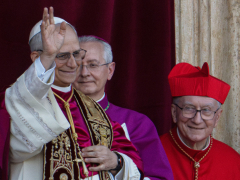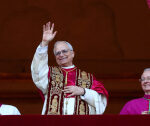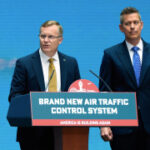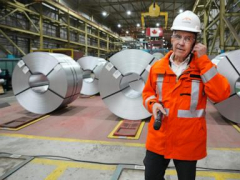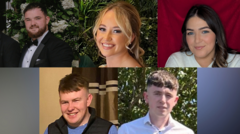Vatican City – It felt like the square could talk in one voice: “Leone! Leone! Leone!”
Thousands of people in St Peter’s Square chanted in chorus the name adopted by Robert Prevost as he ascended to the papacy on Thursday: Leo XIV.
Just an hour and a half earlier, white smoke had billowed from the chimney of the Sistine Chapel, announcing that a conclave of cardinals had elected a new leader for the world’s 1.4 billion Catholics.
Now, it was time to meet Pope Leo himself. A solemn silence fell across the square. The faithful waited to hear the pope’s first message, which would set the tone for his papacy.
“Peace be upon you,” said Leo XIV, appearing on the central balcony of St Peter’s Basilica.
He proceeded to repeat a blessing uttered by his late predecessor, Pope Francis, just weeks earlier: “God loves us, God loves everyone, and evil will not prevail. We are in the hands of God.”
It was a closely watched moment, with red-hatted cardinals poking out of nearby windows to catch their first glimpse at the newly minted pontiff.
Pope Leo XIV was elected on the second day of the conclave, and his opening remarks as leader signalled continuity with Francis, who died on April 21 at age 88. But experts say he is likely to strike a middle path, between furthering Francis’s inclusive agenda and embracing Vatican tradition.
“Peace” was one of the most used words in his brief speech — a choice meant to echo the words that Jesus pronounced after Easter, as Vatican spokesperson Matteo Bruni explained during a news briefing.
Leo XIV called on Catholics to seek “a disarmed peace and a disarming peace” through “dialogue” and “building bridges”, in a brief speech heavy with themes of unity.
“Bravo! That is what we need!” one audience member in the square shouted as the new pope spoke.
Another, 29-year-old Kasper Mihalak from Denmark, was squeezed in the middle of the crowd hoping to catch a glimpse of the first North American pope.
“I am really excited. Cardinal Prevost, now Leo XIV — it’s gonna be amazing! He said a lot about peace during his speech. I think the world now really needs it,” Mihalak said.
Rosaria Venuto could hardly hold back her tears. Early in the morning, she picked up her two children and drove four hours from Ascoli Satriano, a small town in the southern Italian province of Apulia, to be in St Peter’s Square.
“I am deeply moved to have the chance to be here and live through this joy and be a small part of this historical event,” she said.

His own man
Born in Chicago, a midwestern city in the United States, Leo XIV spent more than two decades in Peru, where he acquired dual citizenship.
There, he worked in some of Peru’s poorest areas, and he eventually became the bishop of Chiclayo, in the country’s agricultural north. Then, in 2023, Pope Francis appointed him to lead a powerful office that manages bishops across the world.
Phil Pullella, a Vatican expert who has covered the papacy for more than four decades, said that background offers a degree of continuity with Francis, who hailed from Argentina and advocated against poverty.
“He knows about poverty in Latin America,” Pullella said of Leo XIV. “So, he’s not the same thing as if they had elected some cardinal of New York, for example.”
That continuity was likely appreciated by conservative camps at the Vatican, as well as liberal-leaning ones, Pullella added.
“He comes from the wealthy world, but he witnessed firsthand the problems of the Global South in a poor country,” he said.
Still, Pullella noted that the way Leo XIV dressed showed that “he is going to be his own man”.
Instead of the simple white cassock that Pope Francis wore in 2013 when he was elected, Leo XIII added a traditional red cape over his vest, symbolising the spiritual and temporal powers of his office.
“In a sense, he is going back a little bit to that kind of tradition,” Pullella said. “He would not have been elected had he not had the votes of the conservative bloc.”

A unifying figure
Leo XIV’s election came as a surprise to many. Many observers were betting on a new pope by nightf

